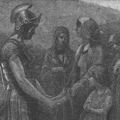36. Coriolanus
"O my mother, mother! O You have won a happy victory to Rome: But, for your son——" —SHAKSPERE. Here is one more story of the old Roman days, before the true history of Rome begins. It is the story of a man, who became a traitor to his country, which was only saved by his mother's tears. When Coriolanus was a boy he was called Caius Marcius. His mother brought him up in Rome, to be all that a boy ought to be, brave and honourable and true. He was also strong, and could run so fast, that none could compare with him. He first fought in the battle of Lake Regillus, said to have been won by the twin gods Castor and Pollux on their snow-white steeds. For his bravery he received a crown of oak-leaves, though only sixteen at the time.
There was a tribe of people living some way from Rome who had a quarrel with the Romans. They were known as Volscians. Against one of their towns, called Corioli, the Romans now marched, and among them was the young Caius Marcius. He fought so well, that it was mainly due to him, that the town was taken. Wherever the fight was thickest, there was the young Roman. At last he was badly wounded. The soldiers begged him to go to his tent that his wounds might be dressed, and rest.
"It is not for conquerors to be tired," he cried, and went on fighting. The fighting over, and the town of Corioli taken, the Roman consul made a speech to the army, praising the gallant deeds of Caius Marcius.
"Of all the plunder we have gained we will give the tenth part to Caius Marcius," he said, "for he has well deserved it." He then crowned him and gave him the surname of Coriolanus in honour of his victory. Coriolanus refused all reward; he only asked for the freedom of a friend who had been taken prisoner.
Soon after this, there was a great famine in Rome. During the wars, no one had tilled the land, and there was no corn, except what was brought from Sicily.
One day a large shipload of corn arrived from Sicily; Coriolanus stood up in the Senate and proposed withholding it from the people. The people were furious.
"Coriolanus would take from us this foreign corn, which is our only chance of getting bread for our children," they cried, "unless we give up our power of voting for laws. He will make us slaves or force us to die of hunger." They tried to kill Coriolanus, and the Senate ordered that he should be tried. He was tried and condemned to exile. He must leave Rome and never return.
In vain he pleaded that he loved his country. The people were firm. He must go. Then the love of Coriolanus for Rome turned to hate, and with the fierce words, "There is a world elsewhere," he left them. He went straight to the country of the Volscians, and entering the house of the warrior chief, he sat down by the fire and covered his face with his cloak. At last he spoke.
"I am Caius Marcius," he said, "the man who has done so much to harm you. The ungrateful people of Rome have driven me away from their city. I come to ask you to let me join you against the Romans." The warrior was greatly surprised; but the Volscians were delighted to have Coriolanus, and very soon they led a large army against Rome.
When the Romans heard that the banished Coriolanus was in command of an army of the Volscians within five miles of Rome, they were very much alarmed. They sent friends of his—men he once loved—to plead with him for his native city; but Coriolanus told them unless they would give up a large piece of land to the Volscians he would fight.
Again the Romans sent messengers to plead with him. But in vain. He would not relent. He intended to have his revenge on Rome. At last the Romans thought of a last resource. They remembered the love that Coriolanus had always borne his mother, and they now begged her to go to him and beg him to spare Rome.
Taking one of her little grandsons by the hand, accompanied by her daughter-in-law leading the other, and followed by a band of Roman women, Volumnia stood, one day, before her exiled son Coriolanus. In pitiful terms she told him of Rome's unhappiness at his action; she spoke of her own misery at his fall and plan of revenge; she reminded him of his upright youth, his honour, and his old love for her. Kneeling at his feet, the two women and the children entreated him to spare Rome. The proud man was touched. What the other messengers could not do these Roman women had accomplished.
"Oh mother, mother! what have you done?" he cried, gently raising her up. "You have saved Rome, but lost your son. I go, conquered by you alone." The women carried the glad news back to Rome, and Coriolanus led his army back to the Volscians. But they were angry at his having made peace with their enemies, and they arose and killed him.
So Coriolanus died, and the Romans built a temple on the spot where Volumnia had knelt to him.

